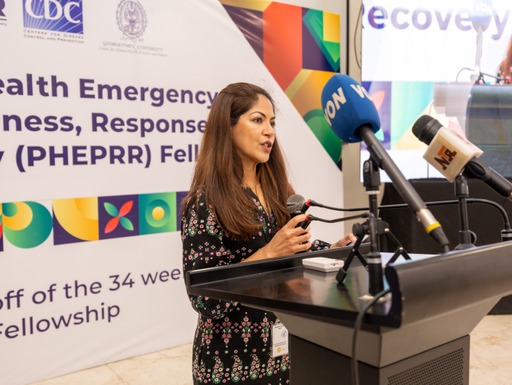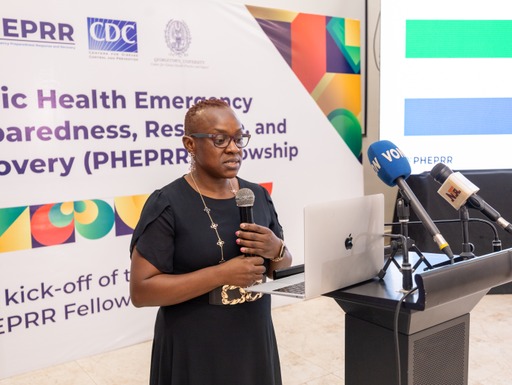Georgetown University Center for Global Health and Impact, through Georgetown Global Health Nigeria, with funding and collaboration from the United States Centers for Disease Control and Prevention launches the Public Health Emergency Preparedness, Response and Recovery (PHEPRR) Fellowship for Africa.
The fellowship seeks to create an internationally recognised surge capacity training programme to enhance emergency competencies among public health workers, facilitating better preparation, response, and recovery from public health crises.
At the opening ceremony, Dr Farah Hussain, Project Officer, Assuring Public Health International and Domestic Security of the US CDC Nigeria Country Office, highlighted the ongoing health challenges in West Africa adding that apart from COVID-19, the region grapples with severe outbreaks of diseases such as Ebola, smallpox, measles, cholera and diphtheria.

According to her, these outbreaks often occur simultaneously in the same areas and countries, straining limited resources and leading to response fatigue among healthcare workers.
Dr. Hussain stressed the importance of community capacity in determining the severity of emergencies, citing the stark contrast between ongoing meningitis outbreaks in the United States and in Nigeria and Sierra Leone.
She underscored the critical role of a trained workforce and prepared staff in enabling swift responses to health crises, potentially preventing localised outbreaks from escalating into public health emergencies.
Dr. Hussain said the Public Health Emergency Preparedness Response and Recovery Fellowship aims to address these challenges by establishing a standardised training programme for key public health professionals.
“This fellowship represents a crucial step forward in enhancing our ability to respond effectively to health emergencies,” Dr. Hussain remarked. “We look forward to the valuable insights and experiences… Our ultimate goal is to ensure that health programmes are not only prepared for, but can also recover from these events.”
Georgetown University Center for Global Health and Impact, through Georgetown Global Health Nigeria, with funding and collaboration from the United States Centers for Disease Control and Prevention launches the Public Health Emergency Preparedness, Response and Recovery (PHEPRR)… pic.twitter.com/dGGYN0xTgV
— Voice of Nigeria (@voiceofnigeria) April 16, 2024
The Public Health Emergency Preparedness Response and Recovery Fellowship stands as a testament to the commitment of the healthcare community to safeguarding public health in West Africa and beyond.
Also speaking at the event, the Senior Public Health Advisor and Deputy Resident Director of Georgetown University Centre for Global Health Practice and Impact, Piring’ar Mercy Niyang stated that the fellowship is finally being launched after two and a half years of exploration, understanding and efforts to define its meaning.

Niyang who cited the experiences of healthcare workers during the COVID-19 pandemic remarked that certain gaps were pointed out which prompted a rejig of the planning to incorporate capacity building.
She noted that the fellowship is expected to close that gap experienced during the pandemic adding that “it’s targeted at those healthcare workers, public health workers, that don’t traditionally work within an emergency management centre. And it’s expected that with the capacity building, they would actually be able to link to the emergency operations centre with any health event and would have better coordination and collaboration for those events, would have better outcomes, would see better achievements and possibly even avert some of the health threats that tend to affect us.”
Niyang added that the training programme which targets mid-career multi-sectoral public health professionals, aims to equip decision-makers with leadership competencies in emergency management across various sectors, including surveillance, laboratory and clinical services.
“So we are focusing largely on engaging with colleagues that traditionally work within the ministries of health or their associated ministries, departments, and agencies. We have used the WHO, IHR, GE thematic areas as our guide to describe all the most sectorial partners that would fit into our non-emergency management participants. We are targeting officers within those ministries and from various countries that are admitted to senior level that can influence practice and to an extent policy at the levels where they are. We are looking at incorporating colleagues that have completed the full epidemiology training program,” she added.
https://www.youtube.com/watch?v=hBAJBzrs_wg
Highlighting the importance of emergency preparedness, the 5-day programme aims to address the critical pillars within the International Health Regulations (2005), aiming to prevent paralysis of the public health system during emergencies.
Expected outcomes include the development and testing of surge operations and workforce plans, enrollment in a knowledge-sharing network and facilitation of regional collaboration and coordination efforts.
Participants at the programme include Dr Othniel Houma (Benin Republic), Fatmata Kanija Jalloh (Sierra Leone), Mr Sumaila Abubakari (Ghana), Mr Modou Jallow (The Gambia), Dr Lois Olajide and Dr Longji Dakum (Nigeria).

K Fosu The Informant is a lifestyle blogger with 6 years' experience in content and web development. He is a Google keyword planner, SEO analyst, an influencer and entrepreneur who holds BA Degree from Ghana's Premier University.



